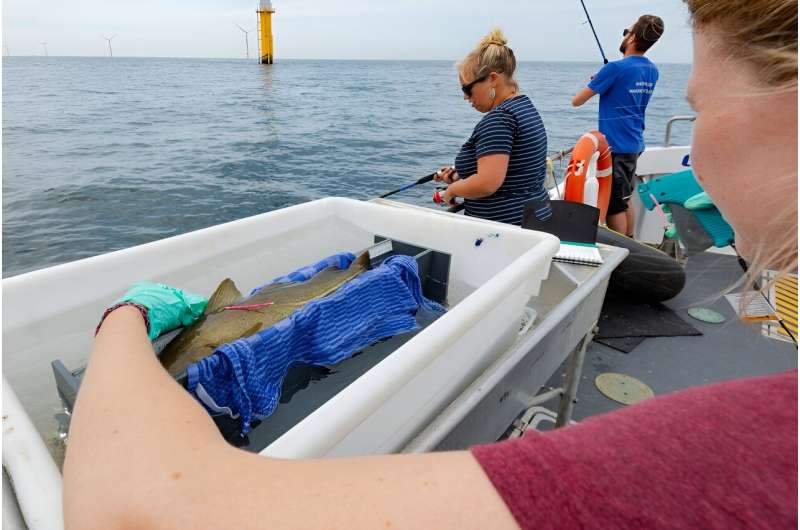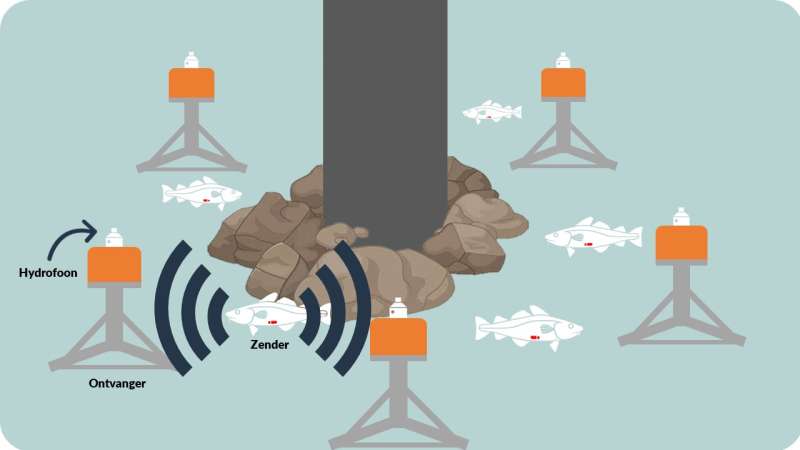This article has been reviewed according to Science X's editorial process and policies. Editors have highlighted the following attributes while ensuring the content's credibility:
fact-checked
peer-reviewed publication
trusted source
proofread
Human noise makes cod inactive. When it gets quiet again, they take off

She narrowly defied bureaucracy and spent days angling for cod. In the North Sea, marine biologist Inge van der Knaap discovered that noise significantly disturbs fish behavior. "There is now a lot of attention for underwater noise."
Every day, seismic surveys take place at sea somewhere in the world. After a loud bang, the echo from the seabed reveals whether there is oil or gas, or whether rocks are in the way of installing wind turbines. Such research requires a marine mammal observer to accompany it, to check that no seals or other mammals are nearby that would be disturbed by it. If so, the survey must wait.
Offshore companies contributed to pay
Whether the fish present are also bothered by underwater noise does not yet play enough of a role in seismic research, Van der Knaap believes. "There is now a lot of attention for underwater noise. It is part of the EU Marine Strategy Framework Directive to protect the marine environment and biodiversity." Offshore companies are obliged to conduct research into this, and they therefore contributed to Van der Knaap's research.
Lots of new information
The key question—does noise threaten fish populations—is very difficult to answer. Van der Knaap got very close. During the disturbance, the fish are less active than usual, their day-and-night rhythm is disturbed, and shortly after the noise they seem to leave the area faster than they would otherwise. "We cannot yet prove that the fish eat less and are less active under these conditions, although that seems plausible. But we do have a lot of new information."
For that new information, Van der Knaap had to overcome many obstacles. "You can't track fish with GPS, that doesn't work under water. Our system had a range of about a kilometer. If the fish would swim away immediately, we would have no data." But she could only start catching those fish if she was allowed to sail between wind turbines prior to a seismic survey.

The perfect spot: A wind farm
"Wind farms in the North Sea turn a sandy bottom into a rich environment where there are plenty of crabs and other food for cod between boulder piles." It is the perfect place for Van der Knaap's research. "It was very difficult to get permission, because of all the legislation. A few times I was on the verge of calling it off." Eventually, she was allowed to accompany the ship the MV Geo Caribbean into the Belgian North Sea, where it would simulate a seismic survey especially for the project.
Van der Knaap fished for days until she had 40 cod—using a net would damage their scales too much. "The hook in their lip injures them less. We anesthetized them, placed a transmitter and threw them back. After a few days recovery time, our experiment began." The transmitters reflected both the position and activity of the fish. "That was very relevant, because a fish can be in one place but still move a lot to forage."
Little activity during the noise
The fish were little active during the noise, which lasted for three-and-a-half days, non-stop. As soon as it was over, almost all cod left the measuring area. All that became apparent when Van der Knaap had pulled the transmitter system out of the water and was able to read all the data. "That was the very best moment of my research: when it turned out that all our fish had stayed nearby during the experiment and I could see exactly what they had been doing."
Van der Knaap received her Ph.D. on her research in January 2023 and has published related findings in the Environmental Pollution journal. She is now continuing to work on fish ecology at Van Hall Larenstein University of Applied Sciences. There, she studies what obstacles such as locks and pumping stations mean for fish. "Fish have been around longer than trees. We almost only see them on our plates, we can't empathize with them very well. I want to make sure we know how they are doing under the conditions we as humans create. That motivates me."
More information: Inge van der Knaap et al, Effects of pile driving sound on local movement of free-ranging Atlantic cod in the Belgian North Sea, Environmental Pollution (2022). DOI: 10.1016/j.envpol.2022.118913
Journal information: Environmental Pollution
Provided by Leiden University




















